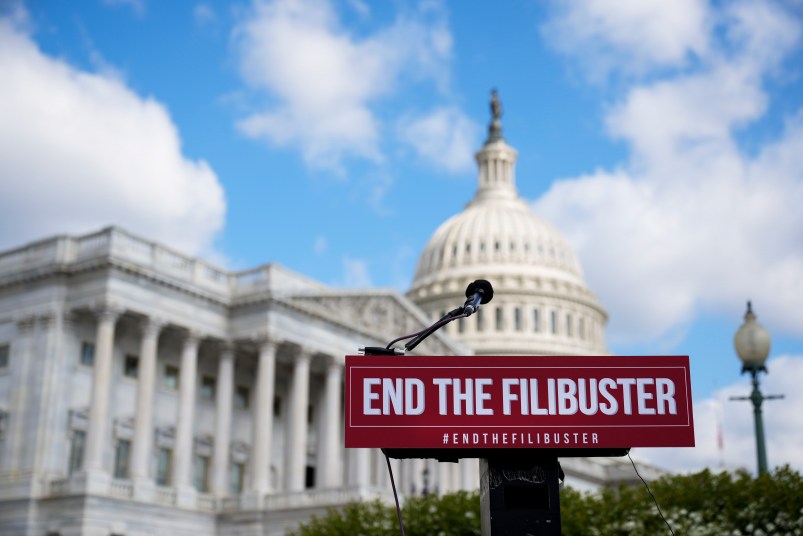Over 350 scholars, historians and political scientists urge Congress to take action on filibuster reform in a new letter first obtained by TPM, arguing that the Framers never intended for the Senate to rely on supermajorities to pass even routine, bipartisan legislation.
The group includes such prominent historians as Pulitzer Prize winners Jack Rakove, Gary Wills, David Hacket Fischer, Daniel Walker Howe, Ron Chernow and Debby Applegate.
They wrote that the Framers “explicitly rejected” the supermajority requirement for most legislation after observing the gridlock caused by the Articles of Confederation mandating the higher threshold for a whole host of federal action. At the Constitutional Convention, the scholars wrote, the Framers nixed the supermajority threshold for all but impeachment, treaties and amending the Constitution.
“Today, the Framers’ vision of the function of the Senate has largely been inverted,” the scholars wrote, pointing out the decline in debate and legislative productivity.
They outlined the heavy usage of the filibuster first by pro-slavery lawmakers and, later, by segregationists blocking civil rights legislation during the Jim Crow era.
“The filibuster is not original to the Constitution: it developed in the early nineteenth century as an exploitation of the Senate’s generous rules of debate, propelled in part by proslavery senators seeking to protect slaveholder interests,” they wrote.
Today, they wrote, the filibuster has all but stopped legislative activity, thereby giving the executive branch outsized power and worsening partisan divides. And perhaps most worryingly of all, they added, is the damage it’s doing to democracy.
They cited statistics that nearly 80 percent of the bills blocked by the filibuster in the past 30 years were bipartisan, and that nearly a quarter of the filibustered bills in the last 16 Congresses were supported by senators representing over 60 percent of the U.S. population.
“This dynamic is untenable for a democracy,” they warned. “A government unable to produce results that significant majorities of the public elect their representatives to deliver is no longer a representative government.”
The scholars did not promote any specific filibuster reform, though all 350-plus of them agree that change has to be instituted.
Over in Congress itself, immediate pressure on Democratic senators to reform or eliminate the filibuster has subsided somewhat, as the caucus has been focused on negotiating over President Joe Biden’s infrastructure plans.
There’s also not a natural rallying point for that fight to play out right now, given the assumption that Senate Majority Leader Chuck Schumer (D-NY) will save the filibuster showdown until it’s over legislation he knows he has 50 votes to pass. That doesn’t appear to exist right now: Democrats are divided over whether to stand behind HR1, the House’s comprehensive voting rights package, or to peel off a smaller and narrower bill named for the late Rep. John Lewis (D-GA); Sen. Joe Manchin (D-WV) hasn’t signed onto the Equality Act which protects LGBTQ rights; lawmakers are still working on proposals in the gun and policing reform areas.
There’s also Manchin’s recent op-ed to take into account, where he said flatly that he would not “eliminate or weaken the filibuster.” The opinion article prompted countless close readings, but, without Manchin’s vote, the legislative filibuster is safe.
Still, some are hoping that the Democrats’ grim political prospects will change his mind. What was already expected, based on historical precedent, to be a difficult midterm election cycle for Democrats could be even bleaker given the coming redistricting process and the spate of restrictive voting laws from GOP-majority legislatures across the country.
Read the letter here:



